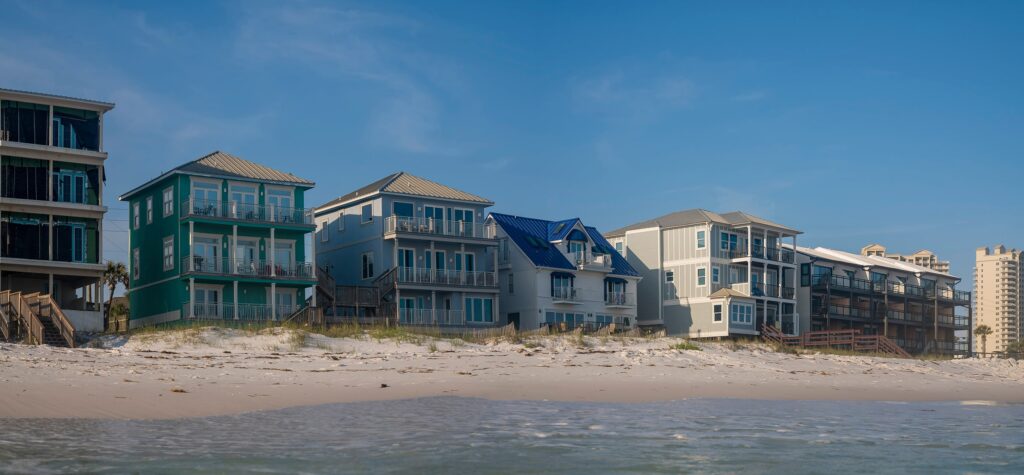Who Should Have an Umbrella Policy? Added Protection for Life’s...
Read More
Shifting Tides: Why Insurance Companies are Exiting States and the Challenges of Insuring Beach Homes
April 20, 2024
The tranquil allure of beachfront living, with its panoramic views and ocean breezes, has long captivated homeowners seeking solace by the shore. However, as climate change intensifies and natural disasters become more frequent and severe, the dream of owning a beach home is increasingly marred by the harsh realities of insurance accessibility and affordability.
Departure from Risk: Why Insurance Companies Are Pulling Out
Insurance companies are in the business of managing risk, but when faced with escalating environmental hazards and mounting financial liabilities, many are choosing to retreat rather than risk exposure to catastrophic losses. Several factors contribute to insurers pulling out of states, leaving homeowners vulnerable and underserved:
1. Exposure to Natural Disasters:
Coastal regions are particularly susceptible to hurricanes, storm surges, and flooding, all of which pose significant risks to properties and insurers alike. As climate change amplifies the frequency and severity of these events, insurers face mounting claims costs and uncertainty, prompting them to reassess their exposure and potentially withdraw from high-risk areas.
2. Regulatory Environment
State regulations governing insurance practices, including rate approval processes and underwriting criteria, can significantly impact insurers’ profitability and operational flexibility. In states with stringent regulatory frameworks or inadequate risk mitigation measures, insurers may find it economically unfeasible to continue writing policies, leading to market exits.
3. Limited Capacity
Insurers must maintain sufficient capital reserves to withstand catastrophic losses and meet their policyholder obligations. In regions prone to frequent and severe natural disasters, insurers may face heightened financial risks and uncertainty, jeopardizing their long-term solvency and prompting strategic withdrawals from high-risk markets.
Stormy Seas: Challenges of Insuring Beach Homes
While the allure of beachfront living remains undiminished, insuring coastal properties has become an increasingly daunting endeavor fraught with challenges and complexities:
1. Erosion and Sea Level Rise:
Rising sea levels and coastal erosion exacerbate the vulnerability of beachfront properties to flooding and structural damage, diminishing their insurability and increasing insurers’ exposure to catastrophic losses.
2. Windstorm and Hurricane Risk
Beach homes are often situated in hurricane-prone regions, subjecting them to the destructive forces of high winds, storm surges, and flying debris. Insurers must assess and price these risks accordingly, often leading to higher premiums or limited coverage options for homeowners.
3. Limited Insurance Options
As insurers withdraw from high-risk coastal markets, homeowners may find themselves facing a dwindling pool of insurance providers willing to underwrite their policies. This lack of competition can result in higher premiums, reduced coverage options, and decreased affordability for coastal residents.
Navigating the Changing Landscape
In light of these challenges, homeowners and policymakers must work collaboratively to mitigate risks, enhance resiliency, and promote sustainable development in coastal communities:
1. Investment in Mitigation Measures:
Implementing proactive measures such as shoreline protection, elevation standards, and resilient building codes can help reduce the risk of damage and minimize insurers’ exposure to losses, making coastal properties more insurable and attractive to insurers.
2. Government Intervention:
Federal and state governments play a crucial role in supporting coastal resilience efforts through incentives, grants, and regulatory reforms aimed at reducing insurance costs, promoting risk mitigation, and ensuring equitable access to coverage for coastal homeowners.
3. Innovative Insurance Solutions:
Insurers can leverage technology, data analytics, and risk modeling tools to develop innovative insurance products tailored to the unique needs of coastal properties, providing homeowners with comprehensive coverage options and greater peace of mind.
The challenges of insuring beach homes and the withdrawal of insurers from high-risk states underscore the urgent need for proactive measures to enhance coastal resilience, promote sustainable development, and ensure the availability and affordability of insurance coverage for coastal communities. By working together to address these challenges, stakeholders can navigate the changing landscape of coastal risk and safeguard the future of beachfront living for generations to come.
Sablich Insurance Group is licensed in both Pennsylvania and New Jersey.Pool Safety Tips Every Homeowner Should Know (and What Your Insurance Needs to Cover)
Pool Safety Tips Every Homeowner Should Know (and What Your...
Read MoreSwing Sets, Trampolines & Liability: What Homeowners Need to Know
Swing Sets, Trampolines & Liability: What Homeowners Need to Know...
Read MoreContact
-
300 Brookside Avenue
Building 4, Suite 125
Ambler, PA 19002 - 215.402.7021
- info@sablichinsurance.com
Site Map
Follow Us
Sablich Insurance Group is licensed
in Pennsylvania and New Jersey
in Pennsylvania and New Jersey
©2023, Sablich Insurance Group
Designed & Developed by Locker Creative



